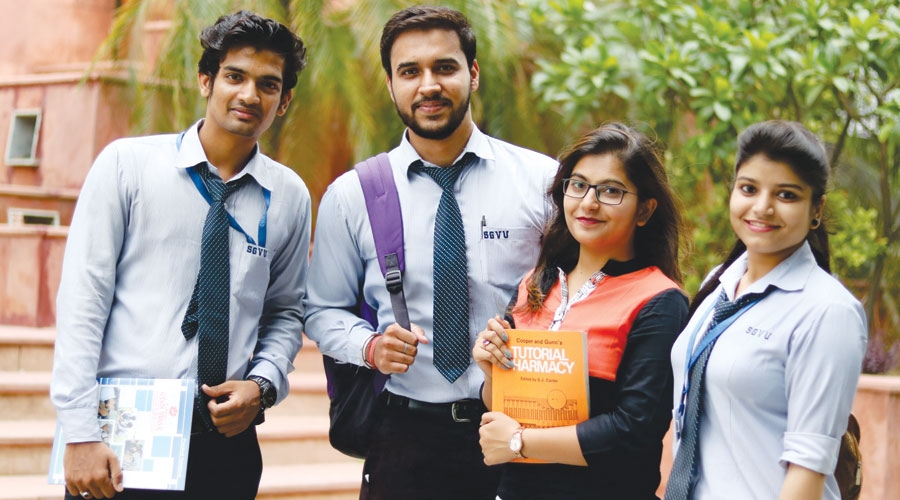
Aug 2025
Course Commencement Date
Scholarship
Up to 90% Scholarship for Girl Students
Duration
Course Type
Fee Amount
The basic eligibility criterion for pursuing the degree is qualifying graduation or equivalent examination in Economics stream or any other stream with economics as a major specialization from a recognized board of the country.
It is a semester-based post-graduation program with a total of four semesters spanning two years. Economics is a blend of ‘core economic theory' and 'econometrics', powered by effective ‘analytical technique to be used in specific settings. It is a systematic synthesis of keen observations, theoretical appraisal of problems, and the development of statistical methods. The system of pedagogy entails tools like - econometrics, statistics, data analysis, simulations, case studies, historical analogy, vernacular aids, field study, and community-based research. The program takes several software packages and data sources to make education apt and efficient.
After completion of degree students will be eligible for UGC NET, Indian Economic services, Data Analytics and join various organization as an Economist and Economic Consultant like; RBI, Financial Institutions, World Bank UNDP, UNO and can appear in civil services.
One of the greatest challenges of the Indian education system is to match its academic curriculum with industry requirements, In terms of knowledge, proficiency, rigor, and skillet. On one hand, there is a need to fill the gap between curriculum at bachelor and master degree levels. On the other, the void that even after master degree a student does not feel well-equipped to take up real challenges head-on. This is because the practical approaches and market applications are grossly missing in the curriculum, resulting in the demand-supply gap in the job market and weaker career opportunities for the youth. The field of Economics is as much an art as well as science, it deals with people, processes, and pragmatism; it also responds to the changing needs that the times offer. Time demands a change in attitudes, temperaments, perceptions, and the way we conduct our learning and teaching of economies. To contribute favorably to the national and international development needs, and enormous structural changes happening around, endeavor needs to be made to meet and match the academic and industry demands. Thus, the course in the MASTER OF ARTS (M.A.) in Economics has been designed to equip students with the knowledge of economic theory and its application, present context. Apart from equipping students with the knowledge of economics, it provides techniques of data analysis and logical thinking.
PROGRAMME OUTCOME
By the end of the programme students will be able to demonstrate competencies in the following:
PO-1: Disciplinary Knowledge
PO-2: Critical Thinking
PO-3: Quantitative & Analytical skills
PO-4: Policy Analysis
PO-5: Research Skills in a wide variety of domains
PO-6: Ethical & Social responsibility
PO-7: Environmental value consciousness
PROGRAMME SPECIFIC OUTCOME
The Master of Arts in Economics aims at molding students to become successful and competent professionals and socially responsible citizens. The key objective is to prepare the students for life. Towards this, a wide array of core courses along with intensive specializations is offered.
At the end of the two- year program, students should be able to:
PSO-1: Gain in-depth knowledge about fundamental concepts in Economics.
PSO-2: Apply economic theory to diverse empirical fields and understand it’s working in real world scenarios.
PSO-3: View problems and phenomena beyond the discipline specific lens by acknowledging plurality of concepts, theories, and methods.
PSO-4: Use statistical and econometric methods in their empirical research work.
PSO-5: Use software packages for analyzing and interpreting data.

The Suresh Gyan Vihar University, Jaipur is a renowned University, established by an Act of State Legislature in the State of Rajasthan by the Suresh Gyan Vihar University, Jaipur Act, 2008 (Act No. 16 of 2008). The University is ranked by NIRF-2024 in the Rank-Band of 101-150 with the School of Pharmacy at 49th rank, and also university appeared in the overall rank band for the first time in the rank band 151-200. It is due to the consistent effort of ensuring quality and ethics in our delivery that the SGVU has been granted an "A+" grade accreditation by NAAC, achieving a score of 3.32 out of 4. Furthermore, the university's agriculture program and college have received accreditation from ICAR for five years. Based in Jaipur, it is also one of the only few research-driven Universities in Rajasthan with DSIR-SIRO recognition. Other major program approvals includes PCI, UGC-DEB, RCI, BCI, NCTE and AICTE.
Apply Now